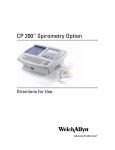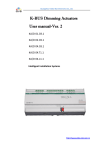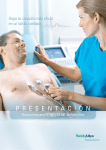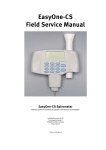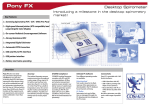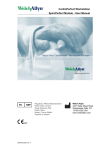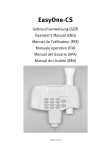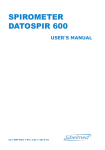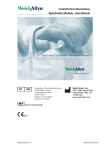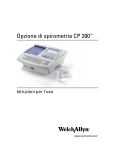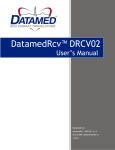Download CardioSoft* Diagnostic System Tender Specifications
Transcript
GE Healthcare CardioSoft* Diagnostic System Tender Specifications User Provided Hardware • The clinical acquisition system PCs must run Windows® XP Professional or Windows 7 Professional • Processor: “Pentium 4 Class” Processor ≥ 1.6 GHz (Windows XP Professional), “Pentium 4 Class” Professional, ≥ 2 GHz (Windows 7) • The system supports laser printers both Letter and A4 paper sizes • The system has minimum of 20 GB hard drive with 4 GB of free HDD space • System has at least 512 MB RAM, 1 GB is required for Windows 7 Professional • The system must use Windows operating system compatible monitors, printers, mouse interfaces and external storage devices, CD-RW, SD card and USB external hard drives • The system must support USB and serial compatible peripheral devices • Graphics adapter: SVGA 1024 x 768 minimum (SXGA 1280 x 1024 recommended) Connectivity • The system must be interfaced to electronic medical records systems (EMRs) using either EMR Gateway (HL7/XML) or a direct, embedded interface • The system must provide a bi-directional interface to the GE Healthcare MUSE* Cardiology Information System • The system must support DICOM formatted report export • The system must support bi-directional DICOM modality worklists • The system must support client workstations and shared database capability. (Windows XP Professional or Windows 7 Professional) • The system must support client workstation operation in Citrix® network environments • The system must provide patient procedure data storage on a PC network • The system must provide a Web viewable (HTML) report and the associated Web-portal structure • The system must export a structured XML data export • The system must provide a configurable TTL synchronization pulse for imaging and other external devices (CAM USB A/T) • The system must be able to switch between a shared database and stand-alone database mode • The system must allow for database synchronization when re-connected to a shared database configuration • The system must allow automatic and manual procedure transfer (shared DB, DICOM, MUSE) • The system must accept ECG data from GE cardiographs: MAC* 800, MAC 1200, MAC 1600, MAC 3500, MAC 5000, MAC 5500 • The system must provide a configurable timeout tool to release unused workstation licenses • The system must support editing and procedure review in Citrix network environments • During the procedure, the user must be able to review procedure and patient information from the active ECG screen • The system must provide multi-level and multi-person password protected security Clinical Application Software • The system must support 3-, 6-, 12- and 15-lead ECG acquisition, display and reporting. • All leads configurations can be displayed on-screen and printed in final reports • The system must provide pop-up medians in post-test review to view individual QRS complexes time synchronized to leads viewed in the trend graphs • The system supports a suction electrode system (KISS) • The system must provide interpretative tools for resting ECG (12SL*) • The system must interface with the Tango+ Automated BP system (requires CAM USB A/T) • The system must provide interpretative tools for stress ECG (XTI) • The system must provide a metabolic cart communication interface configuration • The system must provide risk assessment tools – CAD, Stroke and Duke Treadmill Score System Compatibility • The system must have customizable final report • The final report must be configurable with a logo or image for display and printing • The system must allow configurable color schemes to display real-time data • The system must allow configurable color schemes for final report printing to color printers • The system must provide bi-directional data interface via BDT/GDT V2.1 • Final reports must be exportable from the system in Word, PDF or DICOM • Comprehensive procedure data must be exportable from the system in XML, Excel and HL7 • The system must provide risk assessment tools – T-Wave Alternans (TWA - MMA method) • The system must allow for ECG display speed and amplitude adjustment • The system must provide audio ECG during review to convey arrhythmias • The system must provide ECG freeze-frame during real-time display • The system must store and display for review up to 60 minutes of resting ECG data • Must have one or more of the following regulatory clearances: 510(k), CE mark, SFDA, KFDA, CSA • The system must allow for comparison to previous procedures data including ECGs with measurement ability (calipers) of all traces • The system must provide interfaces to Holter programs to allow report viewing • The system must provide reporting functionality to include results from up to twenty prior procedures. Procedures may be of different modalities • The user system controls must be available as icons or as translated text • The system must provide BP measurements in both mmHg and kPA • The ECG trace display speed must be adjustable in real time • System must be able to freeze ECG tracing during procedure while real-time ECG is displayed • The system database must be sortable by procedure type, patient name, date of procedure, patient ID or confirmed status • During procedures, user must be able to open a previous procedure for the same patient to assess baseline, peak and maximum ST depression points • The system must be able to reanalyze ECG procedure data, reset measurement points and recalculate S-T segment values based on new points • The system must be able to score patient test results using Duke Treadmill score • User controlled filters: FRF, cubic spline, line filters for 50 Hz and 60 Hz, and low pass filters from 20 Hz to 150 Hz • The system must provide full disclosure ECG and allow detailed review and measurement of full disclosure ECG • The system must provide impedance check to support quality of electrode preparation • Full disclosure ECG must be exportable as an XML data set • The system must provide on-line user manual with indexed hyperlinks • The system must allow full disclosure strips to be appended to final report • The system must allow 10-second in-test strip to be appended to final report • The system must be configurable for paperless documentation storage/archiving • The system must support remote technical support via the Internet • The system must support viewing of final reports using non‑proprietary, free software • The system must support saving final reports in non-proprietary format • The system must have the ability to simulate a stress test for quality assurance and training • The system must have the ability to change protocol to any other programmed protocols or manually control the system during the procedure • The system must support automated ramped, staged or pharmacological protocols • The system must have the ability to review final report and in-test reports on screen • The system must have the ability to view 3-, 6-, 12- or 15ECG leads on screen during exam • The system must have the ability to edit final report while viewing ECG in recovery • The system must have the ability to permit user to customize protocols • The system must have the ability to customize user setups • The system must have the ability to modify fiducial point, such as S-T slope and level measurement point • The system must have visual and audible notification for user-defined parameters • The system must have user-customizable screen layouts of vital sign data • Meets or exceeds performance requirements of ANSI/AAMI EC11 for gain accuracy, frequency response, CMRR, system noise, dynamic range, input impedance ** Not all hardware or software options and functions are available in every market or country. Consult with your local GE representative to determine if specific hardware or options are for sale in your market. • On-screen lead view must be selectable and changeable during procedures • The system must provide reports using exercise spirometry data from the ES option • The system must interface with the GE Healthcare T2100, T2000 treadmills • The system must interface with GE Healthcare eBike upright and supine ergometers • The system must provide a detachable patient ECG acquisition module with replaceable patient leadwires • The system must provide detachable, exchangeable connectors from pinch to clip to snap • The system must support spirometry assessment • Spirometry assessment will include FVC, MVV, FEV6, FEV1, FEV1/FVC, FEV1/VC , FEV1/FEV6, MEF25, (FEF75), MEF50 (FEF50), MEF75 (FEF25), MEF25%-75%, PEF, FET, FIVC, PIF, IVC, ERV, IRV, Pre-Post % Variation, Lung Age • The spirometry assessment must include adult-predicted NHANES-III, Knudson_83, Knudson_76, Crapo, Morris, ERS (ECCS/EGKS), Forche (Austria), Sapaldia (Switzerland), Roca (Spain), Berglund, Gulsvik, Hedenström, Gore, Cherniak (only for MVV) • The spirometry assessment must include pediatricpredicted Dockery (Harvard), Hsu, Zapletal, Polgar, Hibbert • The system must support ambulatory blood pressure assessment • Blood pressure assessment will include pulse pressure, averages, diurnal high and low values and graphs ©2012 General Electric Company – All rights reserved. General Electric Company reserves the right to make changes in specifications and features shown herein, or discontinue the product described at any time without notice or obligation. *GE, GE Monogram, 12SL, CardioSoft, MAC and MUSE are trademarks of General Electric Company. GE Healthcare, a division of General Electric Company. Citrix is a trademark of Citrix Systems, Inc. Microsoft, Excel, Word, Windows, and Windows Server are trademarks of Microsoft Corporation Pentium is a trademark of Intel. About GE Healthcare GE Healthcare provides transformational medical technologies and services that are shaping a new age of patient care. Our broad expertise in medical imaging and information technologies, medical diagnostics, patient monitoring systems, drug discovery, biopharmaceutical manufacturing technologies, performance improvement and performance solutions services helps our customers to deliver better care to more people around the world at a lower cost. In addition, we partner with healthcare leaders, striving to leverage the global policy change necessary to implement a successful shift to sustainable healthcare systems. Our “healthymagination” vision for the future invites the world to join us on our journey as we continuously develop innovations focused on reducing costs, increasing access, and improving quality around the world. Headquartered in the United Kingdom, GE Healthcare is a unit of General Electric Company (NYSE: GE). Worldwide, GE Healthcare employees are committed to serving healthcare professionals and their patients in more than 100 countries. For more information about GE Healthcare, visit our website at www.gehealthcare.com GE Healthcare P.O. Box 900, FIN-00031 GE, Finland GE Direct United Kingdom: +44 (0)800 0329201 www.gehealthcare.com EMEA DOC1047317 5/12





